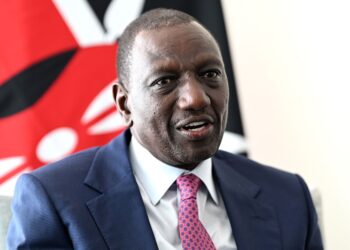“Out of concerns that players would flee,” Eritrea pulled out of the 2026 World Cup qualification.
According to those close to the team, Eritrea’s football association pulled its men’s team from the 2026 World Cup qualification because of concerns that players would try to apply for political asylum while travelling overseas.
Just a few days before they were scheduled to travel to play Morocco in their opening encounter, a joint statement from Fifa and the Confederation of African Football (Caf) on Friday stated that “all of Eritrea’s matches have been cancelled” without offering any other reason.
While the Eritrean National Football Federation (ENFF) has not yet provided a statement, it is believed that players who were born and raised in Ethiopia spent three months getting ready for their qualifying campaign’s first two matches before learning at the end of October that they would not be participating.
It is thought that certain members of ENFF tried to persuade Zemede Tekle, the commissioner for sports and culture, who oversees the federation, to approve the team’s play.
Several individuals close to the team have stated that the primary goal is to stop players from using the national team’s international matches as a means of fleeing and applying for political asylum from the harsh government of Isaias Afwerki, the president of Eritrea, which forces many of his subjects to serve in the military for the rest of their lives.
One person remarked, “This is heartbreaking.” Eritrean football is dying at their hands. Asking for an explanation is difficult for the athletes. If you object, they could put you in jail. You can simply wait to find out their decision.
Paulos Weldehaymanot, the president of ENFF, was approached the media, but he did not reply when asked for comment.
Over 60 players are thought to have used their international status to apply for asylum since 2009.
The most recent case involved five female players who left hours before their match at the Council for East and Central Africa Football Associations (Cecafa) Women’s Under-20 Championship in November 2021 against the hosts, Uganda.
After assisting Eritrea in making it to the Cecafa Cup final for the first time in December 2019, seven male players—Abel Okbay Kilo, Eyoba Girmay, Yosief Mebrahtu, Filmon Serere, Robel Kidane, Abraham, and Ismail Jahar—went missing in Uganda and are still unaccounted for.
Following Eritrea’s 5-0 victory against Zanzibar in the Under-20 Cecafa Cup quarterfinals in Uganda in October 2019, four under-20 internationals—Hanibal Tekle, Mewael Yosief, Simon Asmelash, and Hermon Yohannes—left the country.
Eritrea’s last competitive match was a 2022 World Cup qualifier in September 2019. They were originally scheduled to play Morocco, Zambia, Congo, Tanzania, and Niger in World Cup qualifying. Since then, they have not played a competitive match. Their last match was a friendly against Sudan in January 2020.
Since they have not played in the last 48 months, they are no longer ranked by FIFA. Additionally, because Eritrea does not have a stadium that satisfies Caf standards to host international matches, all of their matches must be played away from home.
The creator of the Eritrean Football website, Daniel Solomon, who had organized his trip to Morocco, remarked, “The problem for Eritrean government officials is that they have to play 10 games abroad.” Unlike the preliminary stages, there are many round-trip matches.
“They are unable to cope with it. I purchased a ticket for no reason at all. The mishandling of Eritrea’s government means that supporters of competitive football will have to wait a few more years.
With players like Ali Sulieman Salih and Robel Teclemichael Bahta competing in Ethiopia’s top division, Solomon claims that Eritrea has some gifted athletes.
The Afwerki dictatorship makes it difficult for Eritrean football players to leave the country, therefore it has been uncommon to see them play elsewhere, even in Ethiopia’s neighbour.
According to Solomon, “Teclemichael received offers from China, but nothing materialized because of Covid-19.”
“These athletes would be 27 years old if Eritrea were competing in the 2030 World Cup qualifications. They are losing out on their prime years, their chance to become well-known worldwide, and their chance to be acquired by other teams.
” Despite the hostilities raging in their nations, our neighbours Yemen and Somalia were nevertheless able to field a squad and participate. Could we not follow suit? “















